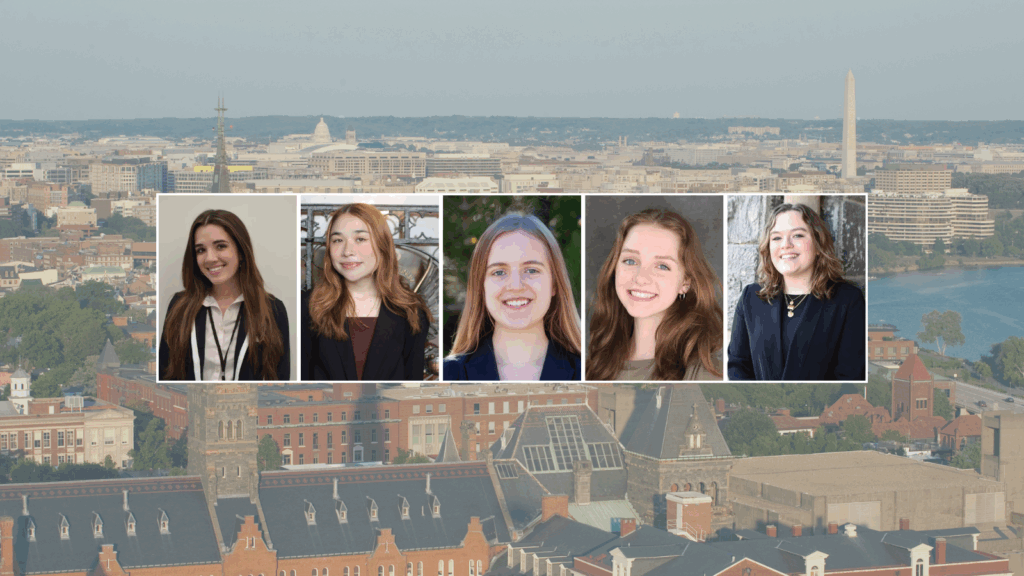Now in its seventh year, the Paul F. Pelosi Scholars Initiative (PSI) continues to uplift exceptional SFS sophomores and juniors through a dynamic program that fosters professional growth, meaningful mentorship and real-world learning. By funding public service internship placements and connecting students with accomplished practitioners and scholars, PSI equips them with the tools and networks needed to thrive in public service.
Established through the generous support of Paul F. (SFS’62) and Nancy Pelosi (H’02), who spearheaded a $1.6 million fundraising effort in 2018, PSI has become a cornerstone for nurturing talent dedicated to the common good and has supported 83 scholars since its launch. The initiative selects students who embody the Jesuit value of “people for others” and connects them to a growing network of alumni, mentors and public service practitioners.
Next in this series, we’re showcasing the 2025 Pelosi Scholars who had internships in the community development sector—spanning local, national and international organizations.
Current SFS sophomores and juniors interested in becoming a Pelosi Scholar can apply here to the 2026 cohort now until September 28, 2025.
Elizabethe Bogrette (SFS’27)
National Institute for Civil Discourse
Elizabethe Bogrette (SFS’27) spent her summer as a congressional engagement intern at the National Institute for Civil Discourse (NICD), a bipartisan policy and advocacy organization dedicated to strengthening democratic dialogue. She conducted in-depth research on judicial reform, contributing to a legislative brief that informed congressional deliberations on prescription drug affordability. Her most recent project involved applying advanced analytics to evaluate the effectiveness of policy interventions in rural communities.
“The role challenged me to strengthen my ability to communicate, understand and collaborate across opposing political priorities, all in service of protecting vulnerable communities. This work holds particular significance for me as a Pennsylvanian, where the opioid epidemic continues to devastate families, friends and neighbors. I know that the legislation we are advancing has the potential to create meaningful change for the community I grew up in, as well as the nation as a whole,” Bogrette says.
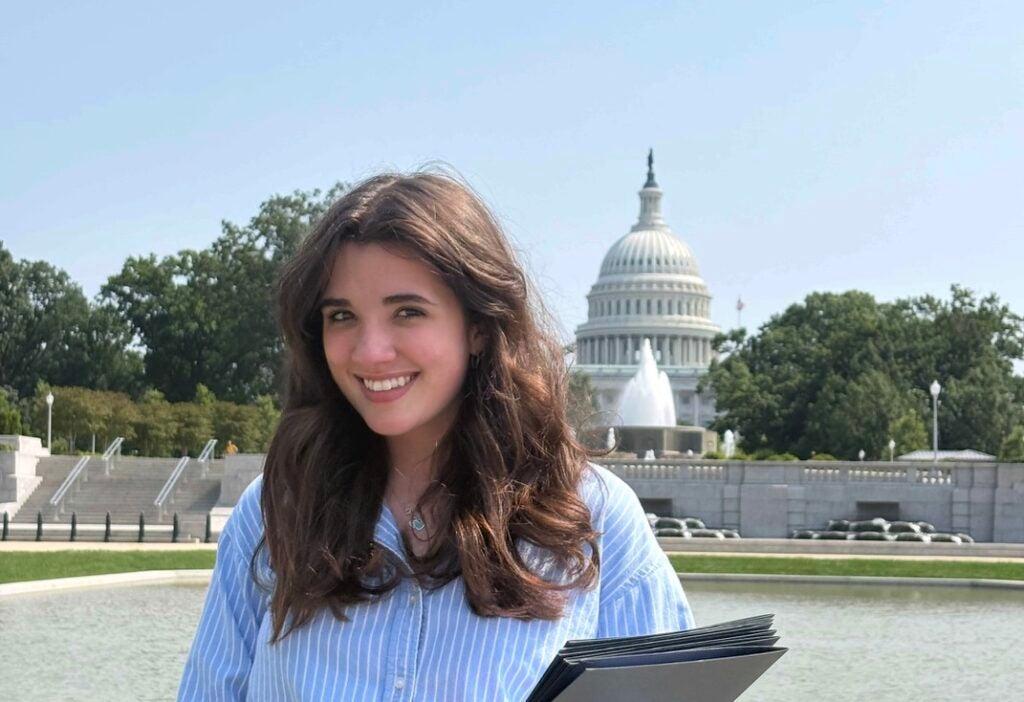
What are you most thankful for from this internship?
I’m so grateful to the team that I was able to work with and the opportunities I was presented with, specifically to be able to sit in on meetings with Senators and House representatives! It was a great way to immerse myself in the DC public sector and get a better understanding of the broader interagency process within government. The people I met through my internship were incredibly passionate about the work they were doing, and it encouraged me to continue to strive to make an impact on the public sector.
How did working in this field/your organization influence your career goals?
I have been able to be in DC during one of the most turbulent times in our country, and working at an organization that prioritized democratic discourse made me feel like I was on the right path, not just professionally but in my life as well. I hope to be able to bring these values of democratic governance and supporting at-risk communities into any role I am in moving forward.
How has this experience shaped your view of public service?
For me, being involved in public service was always a goal. I wanted to serve others and make a distinct improvement on people’s lives, if I could. As we embark into a new era of increased political polarization and uncertainty, I think it’s important to solidify the values of public service: the responsibility we have to strengthen and uplift society. Being part of NICD was a formative step in shaping how I understand service, and I hope to continue learning, evolving and carrying that commitment forward in all that I do.
Sophia Epley (SFS’26)
International Organization for Migration
Sophia Epley (SFS’26) spent her summer in Geneva, Switzerland, as a Labour Mobility and Markets intern at the International Organization for Migration (IOM). She contributed to IOM’s Labour Market Assessment (LMA) Guidelines, leading the development of a toolkit for applying LMAs in contexts such as conflict, reintegration and climate change. She also conducted research on skills mismatches and underemployment among foreign-born populations and co-authored project proposals to enhance recognition of prior learning and upskilling opportunities across regions.
“This year has been incredibly difficult in the realms of international development, migration and foreign policy more broadly, but I am so proud that I never gave up on looking for an opportunity to work for an organization that strives to promote pragmatic, humane and legal migration pathways,” Epley says.

What had the biggest impact on you during your internship?
As a labor mobility intern, the insight I gained into the value of well-managed, safe and orderly labor migration was profound. My research into labor market dynamics and demographic challenges solidified my understanding that the expansion of regular migration pathways is a necessary way to accelerate progress towards the UN Sustainable Development goals, address labor and skills shortages that threaten to disrupt economic growth and provide alternatives to exploitative irregular journeys.
How did working in this field/your organization influence your career goals?
Working in the multilateral space reaffirmed my commitment to working at the intersection of human rights, economics and security in the context of human mobility and border management. While I am unsure exactly what form my career will take, I feel motivated to use my knowledge and international experience to strengthen my own country’s policies and ability to act as a pragmatic and humane leader on the world stage.
How has this experience shaped your view of public service?
This experience highlighted the inherent challenges of a career in public service, particularly as I was at the UN during a time of profound global uncertainty and growing distrust of international institutions. As I helped IOM navigate changing donor dynamics and develop strategies for resilience, I learned that public service is never stagnant and will always entail an element of adaptability and re-evaluation of both priorities and means.
Elizabeth Koenck (SFS’27)
Department of Basic Education, Government of South Africa
Elizabeth Koenck (SFS’27) spent her summer in Pretoria, South Africa, interning with the South African Department of Basic Education in support of a Georgetown University research project on early literacy. The project tracks students from a 2015 literacy intervention to explore how early language education at home influences dropout rates, social mobility and later life outcomes. From coding and statistical analysis to collaborating with education teams across three continents, Koenck saw her SFS education come to life.
“At Georgetown, my classes have often explored how history, politics and policy shape human outcomes. Here in Pretoria, I see those dynamics in real time as I work with schools to understand some of the challenges in enhancing early education,” Koenck says.
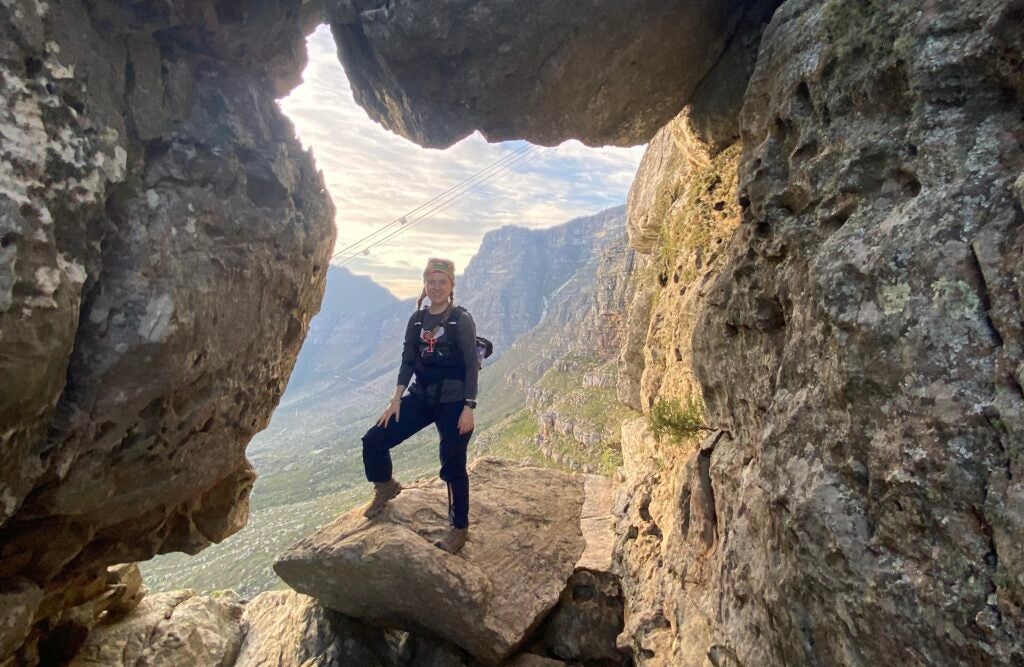
What had the biggest impact on you during your internship?
The most impactful part of my internship was seeing how evidence-based policy can directly influence education equity at scale. Sitting in meetings with the Research Coordination, Monitoring and Evaluation team at South Africa’s Department of Basic Education, I witnessed how decisions about teacher allocation, curriculum and early-grade reading interventions were informed by rigorous data analysis. It was powerful to see research move beyond theory into practical strategies that affect millions of students across South Africa, especially in under-resourced communities.
How did working in this field/your organization influence your career goals?
Working at the intersection of education policy and development economics affirmed my commitment to pursuing a career in international development and public policy. It showed me the value of collaborating with government institutions to make reforms sustainable. This experience reinforced my goal of pursuing graduate studies and ultimately working on global education policy initiatives that advance equity and opportunity.
How has this experience shaped your view of public service?
This experience gave me a deep appreciation for the dedication and resilience of those working in public service. I saw how much effort goes into making the world a better place. Despite limited resources, bureaucratic challenges and immense pressure, my colleagues in the Department of Basic Education showed unwavering commitment to ensuring that every child has access to quality education. It made me realize that public service is not just about policy; it’s about people who believe in creating a better future and are willing to work tirelessly toward that goal. Seeing that passion firsthand has inspired me more than ever to be part of this mission and to contribute meaningfully to work that changes lives.
Ava Zabelski (SFS’26)
Negotiation Works
Ava Zabelski (SFS’26) spent her summer as an intern with Negotiation Works, a DC-based nonprofit that provides negotiation and conflict resolution skills training for DC-area individuals after experiencing incarceration, homelessness, abuse and addiction. Throughout her internship, she attended Negotiation Works classes with the Georgetown Pivot Program, researched best pedagogical practices and created LGBTQ+ curriculum for future partnership programs.
“I learned that public service can manifest itself in many ways, but at its heart it’s about care for not only the whole person, but for every person regardless of their situation. Because I was able to work closely with others, I believe that I was truly able to uplift the community around us,” Zabelski says.
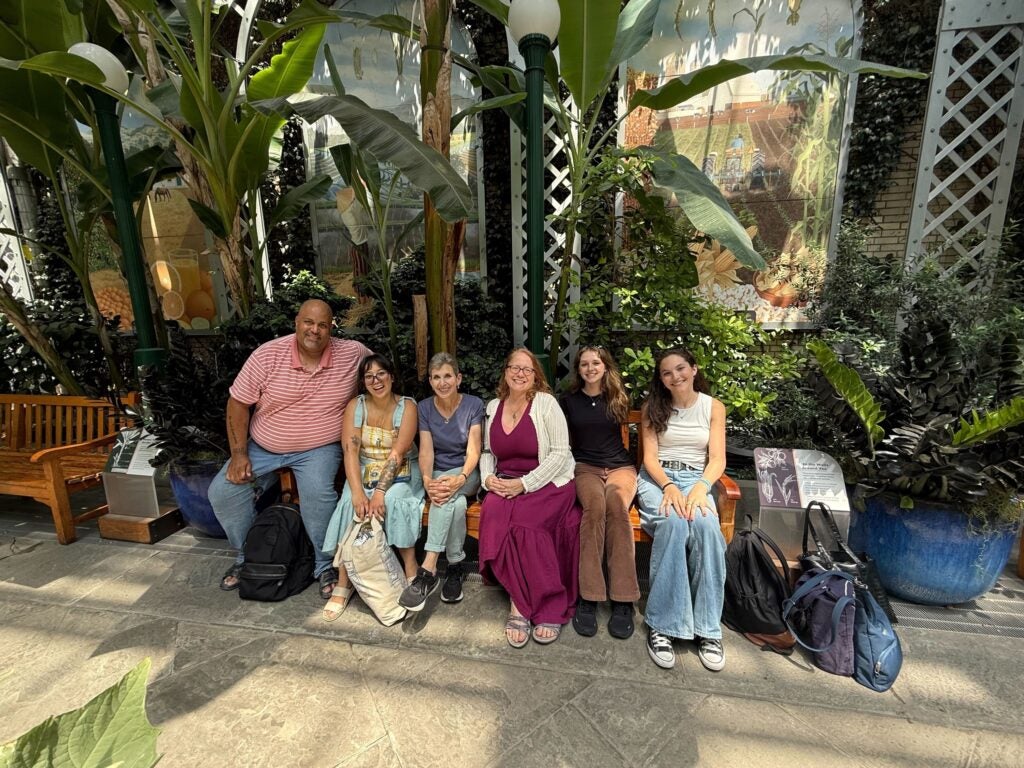
What had the biggest impact on you during your internship?
I worked with individuals who were previously incarcerated, currently unhoused or were coming from other vulnerable circumstances. Seeing that the curriculum I wrote would be implemented in classes across DC, research I conducted would reshape our volunteer training and data I collected would help track long-term impacts on our students allowed me to feel like I was truly making a difference in the DC community.
How did working in this field/your organization influence your career goals?
I also interned in a field that is very different from my major focus, which taught me that pushing outside of my comfort zone to try different career paths before graduation was the best choice for me. Now, I have experienced different forms and focuses within public service and have a better idea of what I hope to pursue in my future career.
How has this experience shaped your view of public service?
This experience has broadened my view of public service. A lot of students at Georgetown view public service only through a government or policy lens. Negotiation Works allowed me to be involved every step of the way and see first-hand the impact of public service on generations of individuals in an NGO and community-focused way. I love working with others and struggle to feel involved if I’m sitting behind a desk every day. With Negotiation Works, my public service looked like going on-site to different educational locations across DC, meeting our partners at their organizations and celebrating our students’ accomplishments at events to create community.
Alicja Farber (SFS’26)
United Nations Higher Commissioner for Refugees
Alicja “Allie” Farber (SFS’26) spent her summer interning at the Office of the United Nations High Commissioner for Refugees (UNHCR) in Washington, DC. Throughout her internship, she worked closely with policy experts to analyze and advocate for immigration reforms while deepening her understanding of the intersection between domestic policies and international geopolitics. Farber’s passion for supporting vulnerable communities and promoting immigrant rights stems from her work with community-based organizations in her hometown. As a Pelosi Scholar, she aimed to expand her knowledge of public service, gain career development experience and strengthen connections with her cohort.
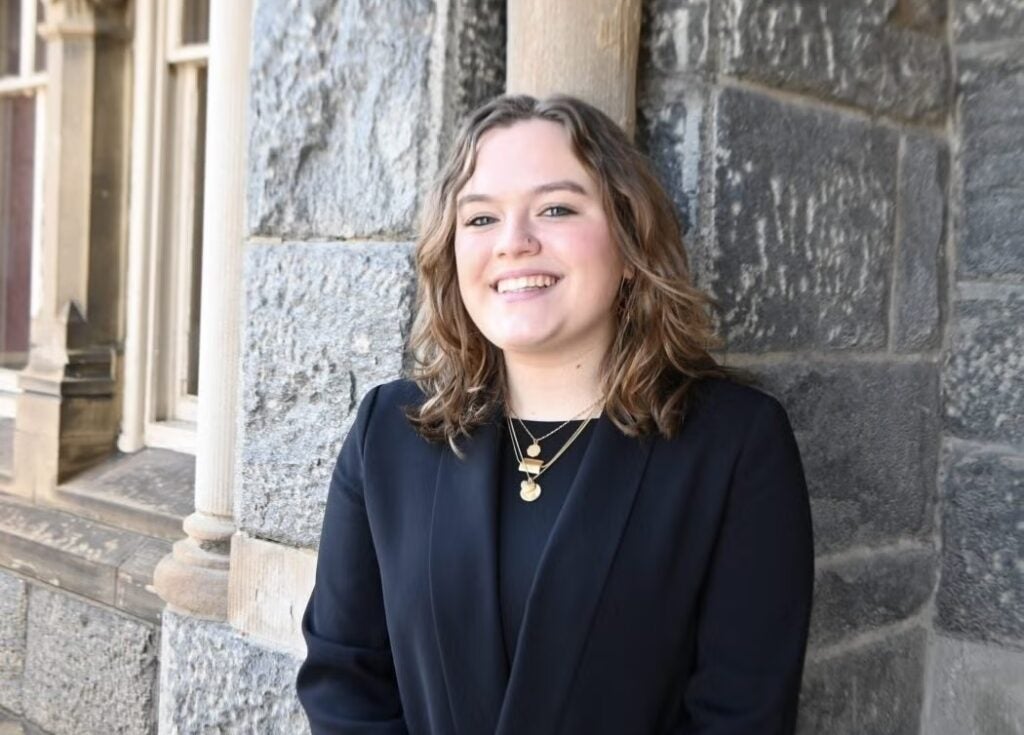
What had the biggest impact on you during your internship?
The moment that had the biggest impact on me was meeting Filippo Grandi, the UN High Commissioner for Refugees, when he came to our DC office. Hearing him speak about his career and reaffirm his support for UNHCR’s mission was incredibly inspiring. What struck me most was the humility with which he carried such an immense responsibility, and the way he spoke about the human stories behind the statistics and scale of global displacement today.
How did working in this field/your organization influence your career goals?
Working at UNHCR solidified my interest in pursuing a career in refugee protection and law. Although my role was not legal in nature, I was regularly exposed to the work of the protection team and legal fellows, which gave me a clearer picture of what it means to practice in that space. Seeing how legal expertise and international policy intersect in the field of refugee protection confirmed my interest in this area of public service. Looking ahead, I hope to combine my passion for law and policy with the kind of international engagement I experienced at UNHCR.
How has this experience shaped your view of public service?
My internship showed me that public service is most impactful when it bridges high-level policy with the realities on the ground. At UNHCR, I saw how colleagues who had worked in field operations abroad brought a unique perspective to our policy discussions in Washington. Their insights made clear that effective public service requires both a global outlook and a human-centered approach, grounded in real experiences of displacement.

